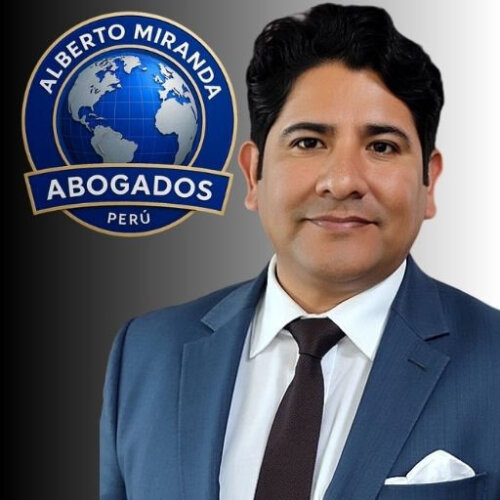Best Administrative Lawyers in Peru
Share your needs with us, get contacted by law firms.
Free. Takes 2 min.
Or refine your search by selecting a city:
List of the best lawyers in Peru
About Administrative Law in Peru
Administrative law in Peru governs the activities of administrative agencies of government. The field encompasses the regulations and procedures related to the operation of government and the interaction between public authorities and private individuals or businesses. In Peru, administrative law ensures that governmental actions comply with established regulations and protects the rights of individuals when dealing with public administration. It's a crucial area of law as it maintains the balance between efficient government operation and the safeguarding of citizen rights.
Why You May Need a Lawyer
There are numerous situations in which individuals or businesses may require legal assistance in the field of administrative law in Peru:
- Disputes over public tenders or government contracts.
- Challenging regulatory decisions made by government bodies.
- Assistance with obtaining licenses or permits from government entities.
- Facing fines or sanctions imposed by government agencies.
- Addressing violations of administrative procedures either by individuals or authorities.
- Guidance on compliance with environmental regulations.
- Resolutions related to labor disputes within state-run institutions.
Engaging a lawyer specialized in administrative law can lead to more efficient navigation of these complex processes and a better understanding of the rights and obligations under Peruvian law.
Local Laws Overview
Key aspects of Peruvian administrative law are embedded within several national statutes and include specific regulatory frameworks for different sectors:
- General Administrative Procedure Law (Ley del Procedimiento Administrativo General): This law outlines the general principles and procedures applicable to all actions by administrative entities in Peru.
- State Contracting Law: Governs the procedures and requirements related to the contracting process with the state.
- Environmental Code: Details the obligations of individuals and companies in relation to environmental protection and compliance.
- Law of Transparency and Access to Public Information: Mandates that government bodies provide citizens with access to information held by the state.
- Municipal Ordinances: Local rules that may further delineate administrative procedures at the municipal level.
Understanding these laws is critical for anyone engaging with administrative systems in Peru, and a legal expert can provide invaluable insight into how these laws may affect specific cases.
Frequently Asked Questions
What is the role of administrative law in Peru?
Administrative law in Peru deals with the regulation of government agency actions, ensuring that they adhere to rightful procedures and respect individual rights.
How do I challenge a government decision?
To challenge a government decision, you typically must file a formal appeal or complaint through the administrative procedure outlined in the relevant statutes.
What can I do if I face a fine from a government agency?
Consider hiring a lawyer to evaluate the fairness of the fine, collect evidence, and possibly file an objection or request a review of the administrative decision.
Is it necessary to hire a lawyer for all administrative tasks?
While not always necessary, a lawyer’s advice can be beneficial in complex situations such as disputes, significant contracts, or licensing matters.
How can I access public information from a government body in Peru?
Under the Law of Transparency and Access to Public Information, you can request government-held information through a formal application process.
What procedures must businesses follow to obtain a government contract?
Businesses must adhere to the guidelines set by the State Contracting Law, which involves various stages including bidding and evaluation procedures.
What is the time limit for challenging an administrative decision?
Time limits for challenging decisions vary but are generally short; it's critical to act promptly and consult legal advice to avoid forfeiting rights to appeal.
Can local municipal ordinances affect my business operations?
Yes, municipal ordinances can impose additional regulations or requirements, and it's important to be aware of these when operating in a particular locality.
What are my rights in an administrative hearing?
Your rights include the right to be informed of the charges, to present evidence, and to have a legal representative.
How can I ensure compliance with environmental laws in Peru?
Consult with experts or legal professionals to navigate the Environmental Code and related regulations to ensure full compliance.
Additional Resources
Consider utilizing the following resources for additional information or support:
- Peruvian Ministry of Justice and Human Rights: Offers legal assistance and resources for navigating administrative legal issues.
- Defensoría del Pueblo (Ombudsman's Office): Provides assistance in cases of rights violations by administrative bodies.
- Government Web Portals: Offer access to legislation, regulatory guidance, and procedures for various administrative matters.
- Bar Associations: Local bar associations can provide contacts and recommendations for specialized administrative law practitioners.
Next Steps
If you determine that you need legal assistance in administrative matters in Peru, consider the following steps:
- Identify the Issue: Clearly define the administrative issue or situation you are facing.
- Research Options: Look for lawyers or legal firms specializing in administrative law within Peru.
- Gather Documents: Compile relevant documents and information that may be pertinent to your case.
- Consult a Lawyer: Arrange for consultations to discuss your situation and options available to you.
- Proceed with Legal Action if Necessary: Based on legal advice, decide on the best course of action and proceed accordingly.
Taking informed steps with expert guidance is crucial to navigating the complexities of administrative law effectively.
Lawzana helps you find the best lawyers and law firms in Peru through a curated and pre-screened list of qualified legal professionals. Our platform offers rankings and detailed profiles of attorneys and law firms, allowing you to compare based on practice areas, including Administrative, experience, and client feedback.
Each profile includes a description of the firm's areas of practice, client reviews, team members and partners, year of establishment, spoken languages, office locations, contact information, social media presence, and any published articles or resources. Most firms on our platform speak English and are experienced in both local and international legal matters.
Get a quote from top-rated law firms in Peru — quickly, securely, and without unnecessary hassle.
Disclaimer:
The information provided on this page is for general informational purposes only and does not constitute legal advice. While we strive to ensure the accuracy and relevance of the content, legal information may change over time, and interpretations of the law can vary. You should always consult with a qualified legal professional for advice specific to your situation.
We disclaim all liability for actions taken or not taken based on the content of this page. If you believe any information is incorrect or outdated, please contact us, and we will review and update it where appropriate.
Browse administrative law firms by city in Peru
Refine your search by selecting a city.










